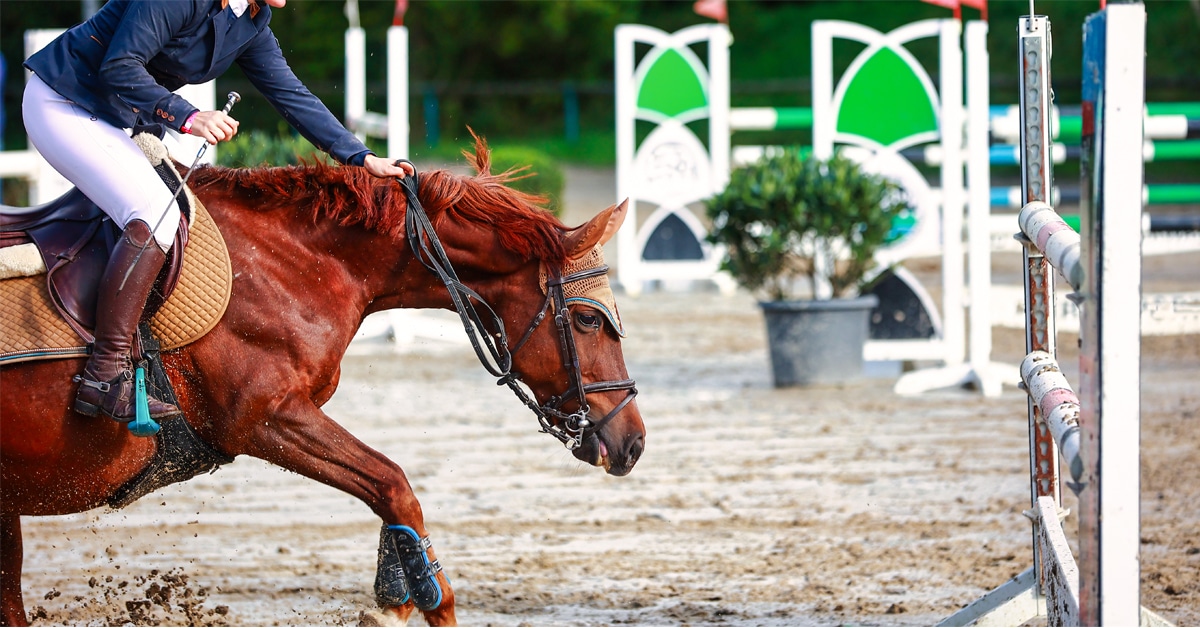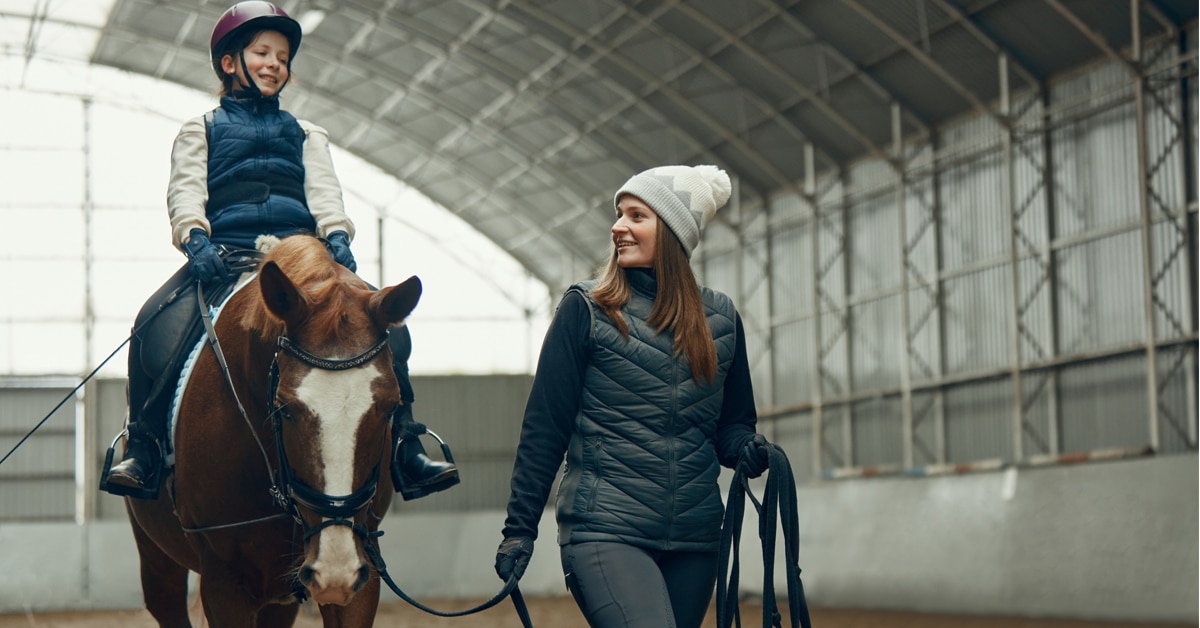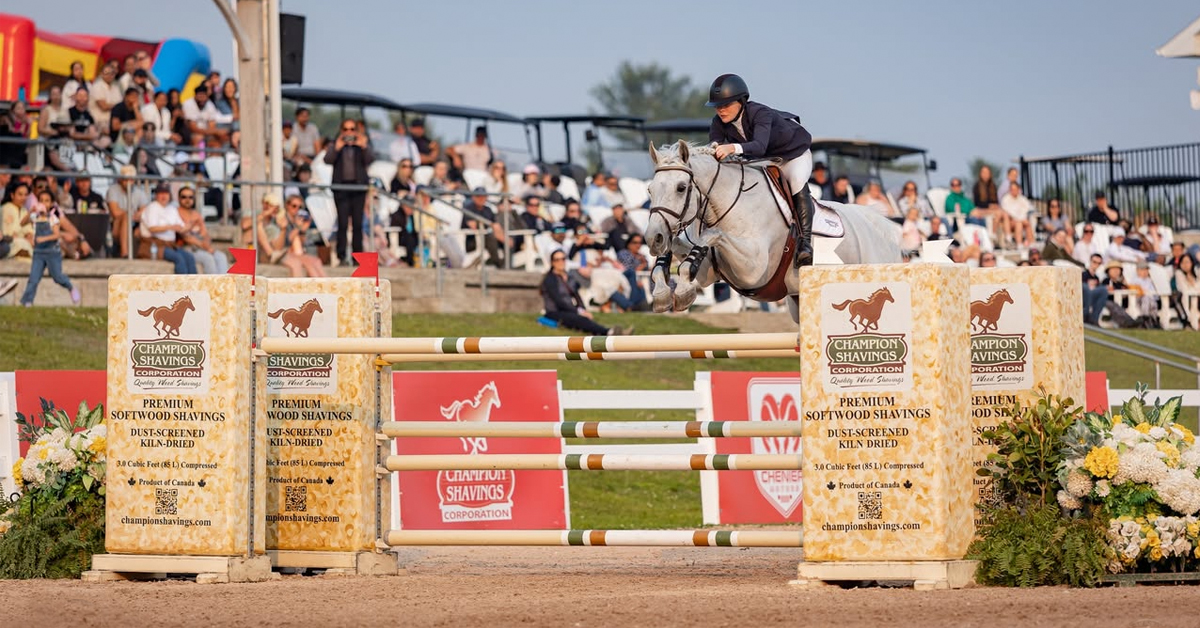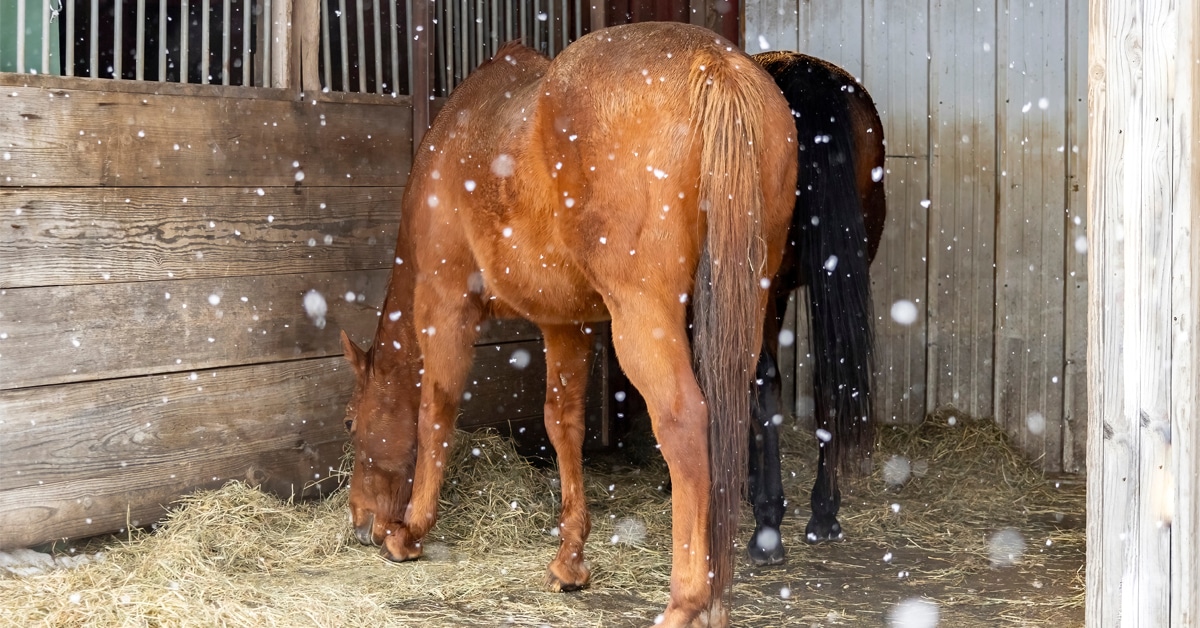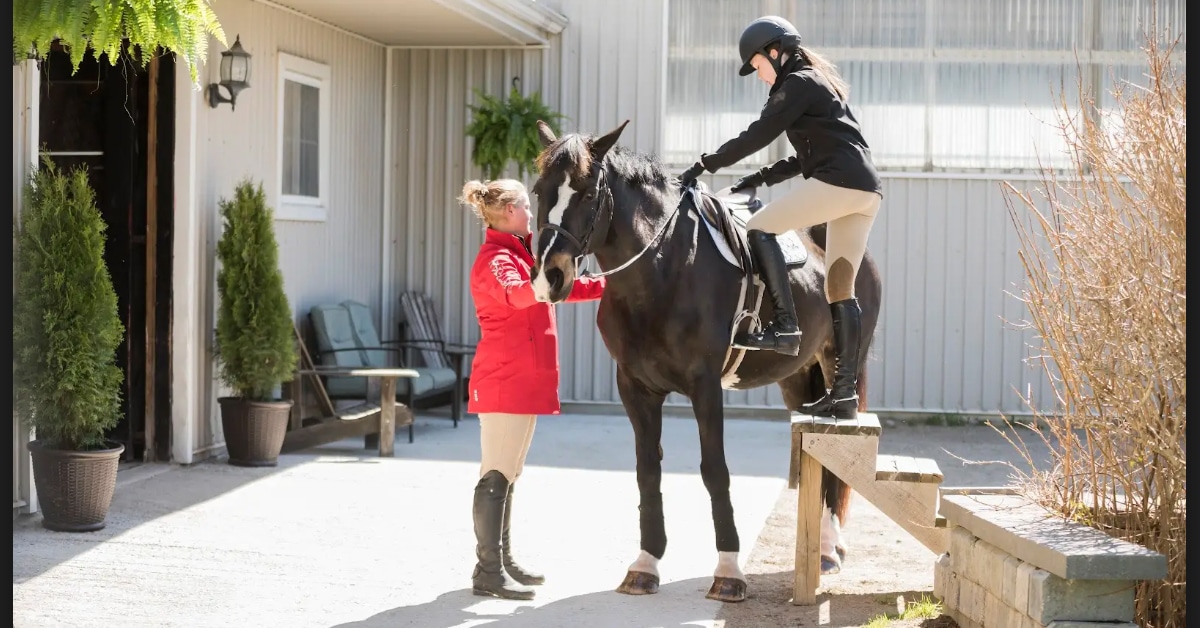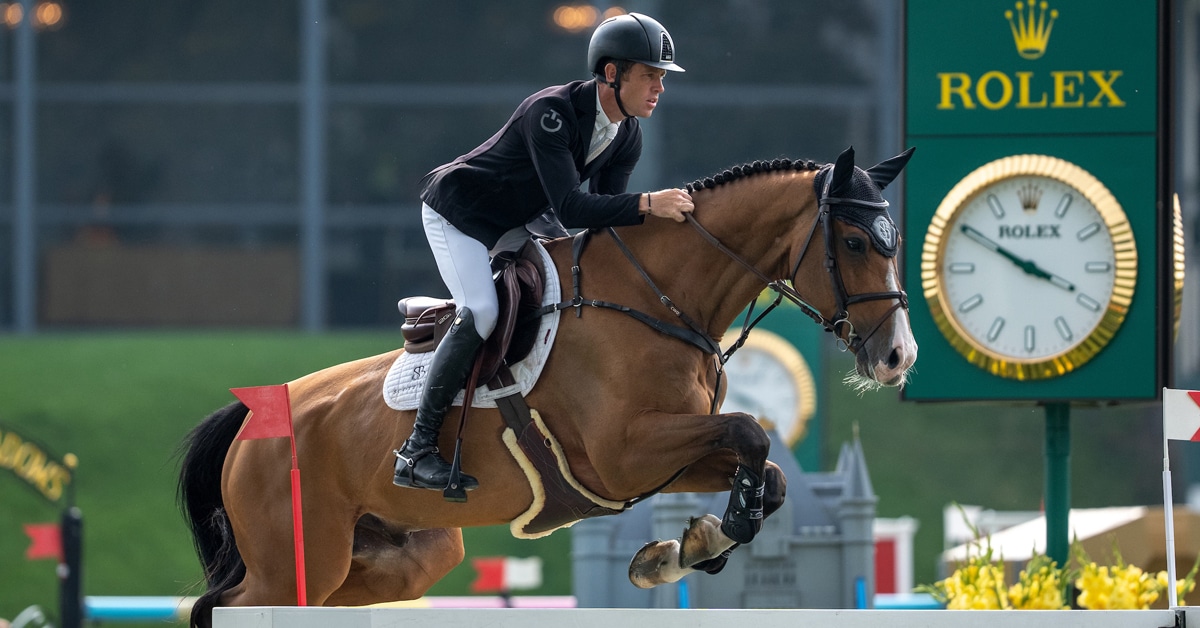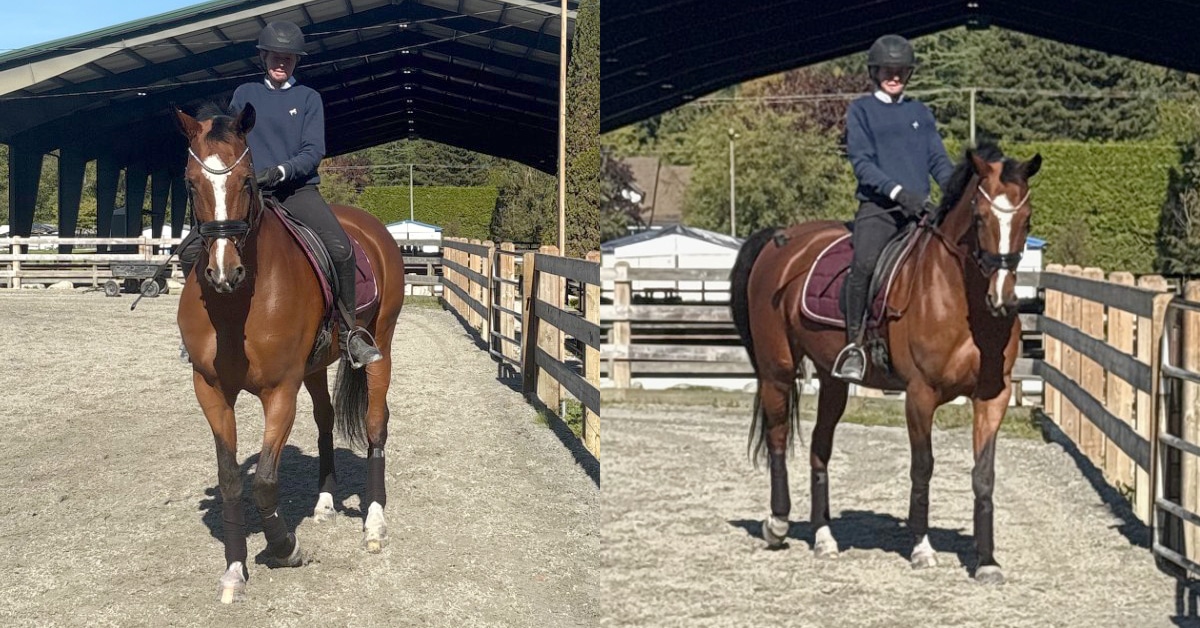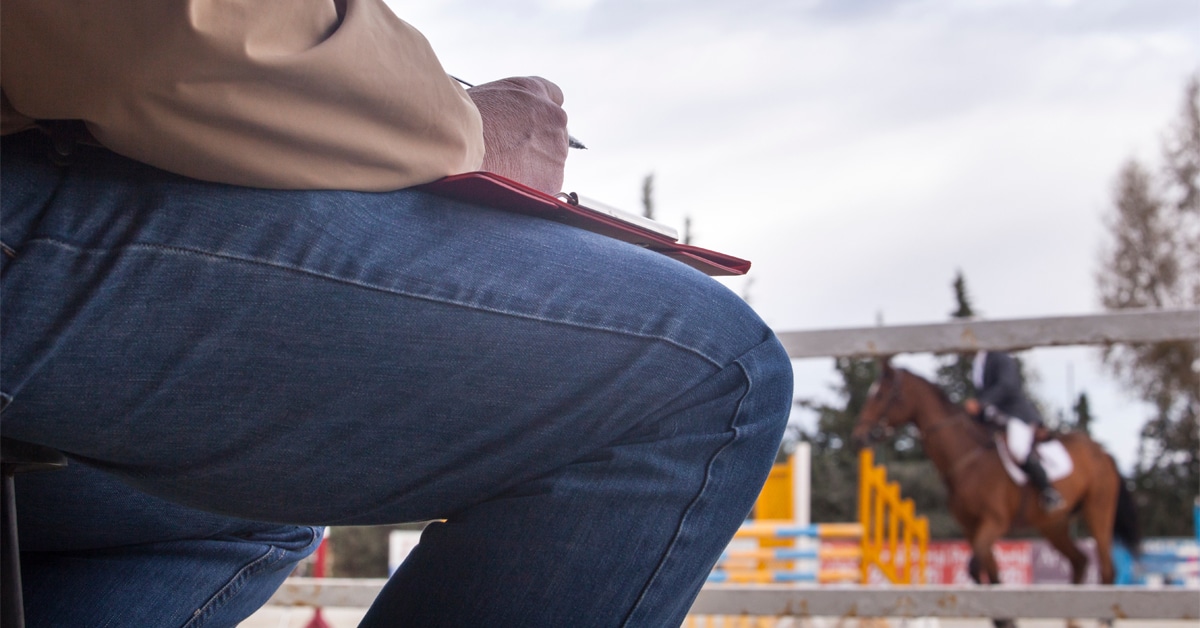Following is an excerpt from Four Legs Move My Soul: The Authorized Biography of Dressage Olympian Isabell Werth by Isabell Werth and published by Trafalgar Square Books / HorseandRiderBooks.com; to order click here.
*****

Already the team competition, where the Germans won the gold medal (obligatory at the time), could hardly be recognized as being about a “team”: Certainly, there were four pairs competing “together” for a medal. Besides Isabell and Nicole, there was the “mounted policeman,” Klaus Balkenhol, with Goldstern, as well as Sven Rothenberger, aboard Andiamo. Yet, the Grand Prix came to a head as a duel between the two young ladies from the same team, who both looked as if they had just outgrown the “horse-girl” stage but fought for the lead as if they were lieutenants of the cavalry.
In the team competition, Nicole had to deal with the moods of her genius Rembrandt. He spooked at the television cameras, which, as would always be incomprehensible to him, moved when he passed them, and he jumped around skittishly. Isabell, on the other hand, carefree with her forward Gigolo, laid down an almost flawless test—only a little slip in the flying changes disrupted the perfect picture. She beat the champion by the fraction of eight points (back then, results were not converted to a percentage). Thus, the metaphorical gauntlet had been thrown down before the individual competition, taking place in the Grand Prix Special the following day.
Nicole vowed that she would get her nervous gelding under better control. Her expression darkened. She seemed to think about nothing else but her next performance and the question of how to derail Isabell’s attack. Her concentration was apparent in her performance the next day: She regained control, focus, consistency, and elegance. Rembrandt did not have the chance to spook—there were only two tiny incidents—and when she left the ring, smiling, she knew: She had brought out the best in her horse.
As Nicole exited the arena, she met Isabell, who was on deck. “See ya,” Nicole said to the younger woman.
The audience held its breath.
Isabell was sure that she could strike back. It was true that Nicole had taken every risk, had ridden all extensions to the maximum. “Riding forward” is what equestrian experts call it. So Isabell did the same, with no less nerve. She risked everything; the attack was on, and Gigolo fought for her and with her.
And Isabell won that duel, once again. It was her first individual title—European Champion. Meanwhile, Dr. Schulten-Baumer gleamed with the satisfaction that his new student had beaten his former student.
Nobody had anticipated that these two young, determined women in their elegant tailcoats, with their hair in tight buns under shiny top hats, would leave their mark on the competitive dressage world for many years to come. “Tough fights with soft hands”—this was the phrase that applied to the regular duels between Isabell and Nicole. And then, when the era of Rembrandt came to an end, the same was true for Isabell and Dutch rider Anky van Grunsven, with her elegant and highly talented horses, Bonfire and Salinero.
Thus, Isabell quickly learned how to win on the sport’s biggest stage. Behind the scenes, however, traveling on the fancy dressage circuit, Isabell sometimes felt out of place—as if she had been transported into a strange world. The elite society of dressage riders, with a strict allocation of roles, long spoiled by consistent success since the last team defeat at the Olympic Games in Munich in 1972, was ruled and controlled by the great Liselott Linsenhoff. All the pieces of dressage came together at the Schafhof in Kronberg, Germany, the stable of this individual gold-medal winner of the Munich Games. Here, close to Frankfurt, numerous gold medals were aimed for and attained, and nobody questioned the successful system. The training practices of the industrial heiress were formative for the entire German dressage scene. Aachen resident Anton Fischer, a laundromat owner with white curls, served as a long-time Chef d’Equipe—essentially, Liselott’s governor and master of ceremonies.
To everyone’s surprise, it came naturally to Isabell to make her way in this world—her goal-oriented successes with such a talented young horse paved the way for her.
Sometimes, I sat there at an expensive dinner and asked myself, somewhat at a loss, whether to use the cutlery from the inside out with every course or vice versa. All these things that were completely normal to everyone else present—how to stay in fancy hotels, how to deal with domestic staff, how to address people, how to behave at special functions, and how to make conversation—I had to pick up all of it. It was learning by doing. Dr. Schulten-Baumer introduced me “into society” and was by my side when the going got tough. And my, at the time, close friendship with Liselott Linsenhoff’s daughter, Ann Kathrin, whom I had met in Mondorf as a teammate, helped me find my way around. All the while I sensed that not for all the money in the world could this way of life replace the warmth I had known in my parents’ house.
Isabell looked around…and composed herself in preparation to conquer a kingdom of which she was to be the queen very soon.
One year later in 1992, at the Olympic Games in Barcelona, Isabell and Dr. Schulten-Baumer were ready to pounce. Their plan was to spoil things for Nicole Uphoff and Rembrandt for the second time after the Europeans, but their Olympic premiere started off badly. Dr. Schulten-Baumer lost his temper so badly, right in the beginning, that he threatened to turn around and go back home. Coming up to the Games, he had expressed his concern several times that they might arrive and there would be no accreditation for him. “Accreditation” amounted to an ugly plastic card that identified someone as a member of the Olympic family. Without it, a person fell in the category of “absolute nobody.”
The situation worsened when all others received the necessary ID cards, even those people from the German Equestrian Federation who had been declared “owners” of Gigolo or reserve horse Fabienne only to exhaust all possible access authorizations and get extra accreditations. It was only Dr. Schulten-Baumer whom Olympic staff members could not find in their computers. He was justifiably upset. He, of all people, the great “maestro,” and the true owner of the horse said to be the hot favorite—Gigolo. He, who should be subject to the greatest respect in the industry, saw himself pushed back into oblivion.
Dr. Schulten-Baumer took this as a personal affront. He grabbed the barrier that he was not allowed to pass, unlike all the others with him, and threatened: “We are leaving!”
Even though his accreditation was found after some time, a negative tension had already spread. And then the accommodations were problematic. There was one house, an hour outside of Barcelona, where all the German dressage participants lived together: Riders, trainers, officials—a crowd that, naturally, was likely to hate each other in such a tense and uncomfortable situation. Everyone suffered from the heavy heat, especially those who were older. It was so hot in Barcelona that one day somebody actually fried an egg on a seat of the Olympic bleachers. And yet, the riders rode in tailcoats and top hats under the merciless sun.
To make matters worse, Mrs. Linsenhoff had hired a cook from the German Army in Warendorf who served the sweaty folks goulash with noodles in the middle of the day. George Theodorescu, the famous trainer and father of Olympian Monica Theodorescu and who later became the German national coach, commented with the attitude of a sophisticated bon vivant: “I only eat goulash when I am in Hungary. And I am never in Hungary.”
For a moment, laughter relaxed the tense atmosphere. But all thought returned to how German dressage riders or their entourage should prepare for the arena when the most dangerous competition could be found amongst their own ranks…and when they were all forced to live together in a shared space.
Nicole Uphoff was engaged to jumper rider Otto Becker at the time. The fact that Otto was also in Barcelona as part of the Olympic jumping team was everything but an advantage for the couple, as he had to live in different accommodations with his team. Hence, they hardly saw each other. Since I had the only room with a phone, I had to frequently accept Otto’s phone calls, bring in Nicole, and leave my room to give their sweet talk appropriate space.
And even worse: Dr. Schulten-Baumer had to share a bathroom with Nicole Uphoff’s parents, with whom he’d had a falling out years before. Within days, the underlying tensions became so overpowering that they eventually broke, and all of us, together, threw the Honorable Anton Fischer into the pool. You can blame it on cabin fever.
It should be noted that the chicken-hearted Rembrandt and the overachiever Gigolo, whose nerves apparently worried everyone concerned, were as cool as cucumbers compared to the irritated humans in the Catalan villa!
The Grand Prix of the team medal competition saw the next episode of combat between Isabell and Nicole. Monica Theodorescu with Grunox was part of the team this time, alongside Klaus Balkenhol. She had to compete under especially difficult conditions: When she entered the stadium, the thermometer showed 104 degrees Fahrenheit.
Isabell and Nicole had their horses perfectly prepared. Rembrandt’s fragile psyche had been wrapped in bubble wrap for days and just shortly before the performance, his rider “woke him up” with slightly more serious activities. Gigolo’s nerves were also taken into account during the time leading up to competing. Isabell acted according to her own plan.
Ambitious and highly focused, both riders performed their tests, and neither of them blew it. Isabell even allowed herself to smile provocatively at the judges as she passed them on the short side. “So?” she seemed to say. “Do you dare to place me in front of the great Nicole again, like you did last year?”
Not this time. Nicole’s lead only amounted to six points—a tiny fraction.
That the Germans won team gold did not surprise anyone, but an even greater cause awaited: the Olympic individual medals.
While Nicole let her Rembrandt shine at what many thought was the height of his career—so much so that the Swiss head judge Wolfgang Niggli claimed the performance brought tears to his eyes—Isabell’s results with Gigolo dropped in the Grand Prix Special, and the Freestyle to music was not yet part of the Olympic program. The performance showed that while Isabell was not lacking the desire and ability to win, she still lacked the experience for such big moments.
Nicole reached the final halt in the heat of the arena with a crimson face. Her groom and fiance Otto Becker had to pour an entire bottle of water over her head as soon as she was out of the saddle. Isabell and Gigolo, on the other hand, were boiling over mentally. This manifested itself as mistakes in the ring. Many very atypical slipups happened. Gigolo got muddled in the flying changes, a pirouette failed…they “screwed up everything,” according to Isabell. She had been flying high, participating in the Olympics at age twenty-three on her only-nine-year-old horse, team-gold-medal-winner in her first attempt with a brilliant performance—the world seemed to stand wide open for Isabell and Gigolo, the shooting stars of dressage. But then they did not shine as much during the finale as they could have, and, at first, the silver medal she won did not seem to be any comfort to Isabell.
The young German rider took away a new experience from Barcelona, which would be useful for coming shows and championships: She already knew how to win. She still had to learn how to lose. The magic of the first year had ended, and she was no longer walking the tightrope with a laugh—she had unexpectedly fallen off. To remain at the top, where the ride for gold medals took place, she needed more than easygoing overconfidence.
I definitely learned the hard way. I would argue now that we were completely overambitious. I had to learn first what I needed to ride my tests just as optimally under pressure and that I must always meet the performance standards.
Isabell’s defeat in the Barcelona duel with Nicole upset her extremely. Not so much because she could not satisfy her personal ambition; she was mostly ashamed that she had disappointed Dr. Schulten-Baumer. He had done so much for her, and it had been possible to repeat the coup at the European Championships in Donaueschingen on a much grander scale at the Olympics…but she had messed it up. Isabell was quite hard on herself and came to the decision that she must grow from the experience. Perfection became the goal once and for all. It was as if dark clouds appeared over her, and she decided to work harder than ever.
The Latest
